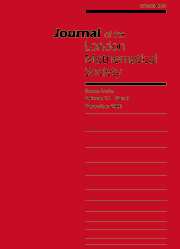ON THE REPRESENTATIONS OF A NUMBER AS THE SUM OF FOUR FIFTH POWERS
Published online by Cambridge University Press: 01 October 1999
Abstract
It is known from Vaughan and Wooley's work on Waring's problem that every sufficiently large natural number is the sum of at most 17 fifth powers [13]. It is also known that at least six fifth powers are required to be able to express every sufficiently large natural number as a sum of fifth powers (see, for instance, [5, Theorem 394]). The techniques of [13] allow one to show that almost all natural numbers are the sum of nine fifth powers. A problem of related interest is to obtain an upper bound for the number of representations of a number as a sum of a fixed number of powers. Let R(n) denote the number of representations of the natural number n as a sum of four fifth powers. In this paper, we establish a non-trivial upper bound for R(n), which is expressed in the following theorem.
- Type
- Notes and Papers
- Information
- Copyright
- The London Mathematical Society 1999
Footnotes
- 2
- Cited by


